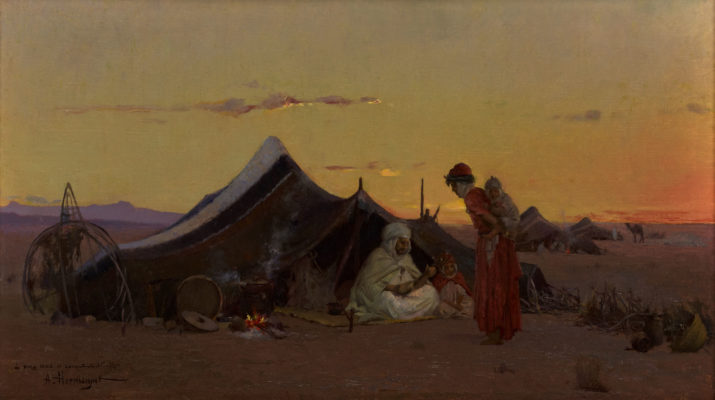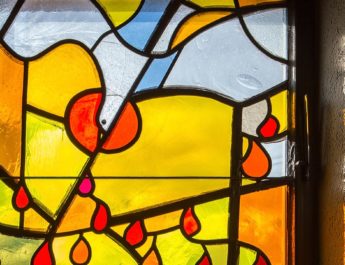Numbers 30
BibleHub
1 Then MosesA spokeB to the headsC of the tribesD
Notes on verse 1a
A “Moses” = Mosheh. From mashah (to pull out in a literal or figurative sense, to draw out) OR from Egyptian mes or mesu (child, son i.e. child of…). This is Moses – the one drawn out from the water, which is to say, rescued. If derived from the Egyptian, his name would share a root with Rameses and Thutmose.
B “spoke” = dabar. This is generally to speak, answer, declare, or command. It might mean to arrange and so to speak in a figurative sense as arranging words.
C “heads” = rosh. This may come a word that means to shake. It is the head, captain, or chief. It can also be excellent or the forefront. It can be first in position or in statue or in time (i.e. the beginning).
D “tribes” = matteh. From natah (to stretch or spread out, extend, bend). This is a staff, rod, branch, or tribe. It could be a rod for discipline or correction. It could be a scepter to indicate authority, a throwing lance, or a walking staff. Figuratively, it could also be something that supports life (like bread).
of the Israelites,E saying, “This is whatF the LordG has commanded.H
Notes on verse 1b
E “Israelites” = ben + Yisrael. Literally, “children of Israel.” Ben is from banah (to build or obtain children). This is son, age, child. It is son in a literal or figurative sense. Yisrael is from sarah (to persist, exert oneself, contend, persevere, wrestle, prevail) + El (God or god). This is Israel, meaning God strives or one who strives with God; new name for Jacob and for his offspring. This refers to the people and to the land.
F “what” = dabar. Related to “spoke” in v1. From dabar (see note B above). This is speech, a word, a matter, an affair, charge, command, message, promise, purpose, report, request. It is a word, which implies things that are spoken of in a wide sense.
G “Lord” = YHVH. From havah (to be, become) or hayah (to come to pass, become, be). This is the name of the God of Israel, the self-existent and eternal one, the tetragrammaton. This pronunciation has been lost to time so “Lord” is generally used in its place.
H “commanded” = tsavah. This is to charge, command, order, appoint, or enjoin. This is the root that the Hebrew word for “commandment” comes from (mitsvah).
2 When a manI makesJ a vowK to the LordL
Notes on verse 2a
I “man” = ish. Perhaps from enosh (human, humankind, mortal); from anash (to be weak, sick, or frail). This is man, husband, another, or humankind.
J “makes” = nadar. This is to vow or promise.
K “vow” = neder. Related to “makes” in v2. From nadar (see note J above). This is a vow – literally, that which was promised.
L “Lord” = YHVH. Related to “Lord” in v1. From the same as YHVH (see note G above). It has a different vowel pointing, but the same meaning as Lord.
or swearsM an oathN to bindO himselfP by a pledge,Q
Notes on verse 2b
M “swears” = shaba. Perhaps from sheba (seven – the number of perfection/sacred fullness). This is to swear, curse, vow, make a covenant. Properly, it can mean to be complete. This is to seven oneself – as in affirming something so strongly it is as though it were said seven times.
N “oath” = shebuah. Related to “swears” in v2. From sheba (see note M above). This is oath or curse.
O “bind” = asar. This is to tie, yoke, bind, or fasten. It can mean to harness an animal, to join in fighting a battle, or to imprison someone.
P “himself” = nephesh. Related to naphash (to refresh or be refreshed). This is soul, self, person, emotion. It is a breathing creature. Can also refer to appetites and desires.
Q “pledge” = issar. Related to “bind” in v2. 11x in OT – all in this passage. From asar (see note O above). This is a bond, obligation, or vow.
he shall not breakR his word;S he shall doT according to allU that proceedsV out of his mouth.W
Notes on verse 2c
R “break” = chalal. This is to pierce, which implies to wound. It is used figuratively for making someone or something profane or breaking your word. It can also mean to begin as though one opened a wedge. Also, to eat something as a common thing.
S “word” = dabar. Same as “what” in v1. See note F above.
T “do” = asah. This is to make, do, act, appoint, become in many senses.
U “all” = kol. From kalal (to complete). This is all or every.
V “proceeds” = yatsa. This is to go or come out, bring forth, appear. It is to go out in a literal or figurative sense.
W “mouth” = peh. This is mouth in a literal or figurative sense. So, more literally, it can be beak or jaws. More figuratively, it refers to speech, commands, or promises.
3 “When a womanX makes a vow to the LordY or binds herself by a pledge while within her father’sZ house,AA in her youth,BB
Notes on verse 3
X “woman” = ishshah. Related to “man” in v2. From ish (see note I above). This is woman, wife, or female.
Y “Lord” = YHVH. Same as “Lord” in v1. See note G above.
Z “father’s” = ab. This is father, chief, or ancestor. It is father in a literal or figurative sense.
AA “house” = bayit. Related to “Israelites” in v1. Probably from banah (see note E above). This is house, court, family, palace, temple.
BB “youth” = naur. From naar (child or a servant; a child in their active years so they could be aged anywhere from infancy to adolescence); perhaps from naar (to shake, toss up and down, tumble around). This is youth or childhood.
4 and her father hearsCC of her vow or her pledge by which she has bound herselfDD and says nothingEE to her, then all her vows shall stand,FF and anyGG pledge by which she has bound herself shall stand.
Notes on verse 4
CC “hears” = shama. This is to hear, call, consent, or consider. It implies listening intelligently, giving attention, and, because of these two factors, obedience and action are often implied.
DD “herself” = nephesh. Same as “himself” in v2. See note P above.
EE “says nothing” = charash. This is to scratch, which implies etching or plowing. It can mean to manufacture regardless of materials used. Figuratively, it can be to devise or conceal. It can also have a sense of secrecy. Hence, being silent or left alone. It can also be speechless.
FF “stand” = qum. To arise, stand, accomplish, establish, abide. This is rising as in rising against, getting up after being sick or asleep, arising from one state to another, becoming powerful, or rising for action. It can also be standing in a figurative sense.
GG “any” = kol. Same as “all” in v2. See note U above.
5 But if her father overrulesHH her at the timeII that he hears of it, noJJ vow of hers and no pledge by which she has bound herself shall stand, and the LordKK will forgiveLL her because her father overruled her.
Notes on verse 5
HH “overrules” = nu. 8x in OT. This is to hinder, discourage, refuse, break, or disallow.
II “time” = yom. Root may mean being hot. This is the day in a literal or figurative sense. It can also mean birth, age, daylight, continually or other references to time.
JJ {untranslated} = kol. Same as “all” in v2. See note U above.
KK “Lord” = YHVH. Same as “Lord” in v1. See note G above.
LL “forgive” = salach. This is to forgive or spare.
6 “If she marries,MM while obligated by her vows or any thoughtless utteranceNN of her lipsOO by which she has bound herself,
Notes on verse 6
MM “marries” = hayah + hayah + ish. Literally, “she has a husband.” Hayah is related to “Lord” in v1. See note G above. The word is repeated twice – the first time as an Infinitive Absolute. The Infinitive Absolute serves to emphasize the sentiment of the word. It is rather like Foghorn Leghorn’s speech pattern, “I said, I said.” Ish is the same as “man” in v2. See note I above.
NN “thoughtless utterance” = mibta. 2x in OT – both in this passage. From the same as bata (to speak without thinking, babble, talk in a rash way). This is a rash vow or statement.
OO “lips” = saphah. This is lip, edge, border, bank – used for a boundary. It can also be speech or language.
7 and her husbandPP hears of it and says nothing to her at the time that he hears, then her vows shall stand, and her pledges by which she has bound herself shall stand. 8 But if, at the time that her husband hears of it, he overrules her, then he shall nullifyQQ the vow by which she was obligated or the thoughtless utterance of her lips by which she bound herself, and the LordRR will forgive her. 9 (But everySS vow of a widowTT or of a divorced woman,UU by which she has bound herself, shall be bindingVV upon her.)
Notes on verses 7-9
PP “husband” = ish. Same as “man” in v2. See note I above.
QQ “nullify” = parar. This is to break, defeat, frustrate, cast off, clean, cease.
RR “Lord” = YHVH. Same as “Lord” in v1. See note G above.
SS “every” = kol. Same as “all” in v2. See note U above.
TT “widow” = almanah. Related to alman (widowed); from alam (to be silent, bound). This is a widow or a house that is desolate.
UU “divorced woman” = garash. This is to cast out or expel. It can be to exile someone or to divorce them.
VV “be binding” = qum. Same as “stand” in v4. See note FF above.
10 And if she made a vow in her husband’s house or boundWW herself by a pledge with an oath 11 and her husband heard it and said nothing to her and did not overrule her, then all her vows shall stand, and any pledge by which she boundXX herself shall stand. 12 But if her husband nullifiesYY them at the time that he hears them,
Notes on verses 10-12a
WW “bound” = asar. Same as “bound” in v2. See note O above.
XX “bound” = asar. Same as “bound” in v2. See note O above.
YY “nullifies” = parar + parar. Same as “nullify” in v8. See note QQ above. The word is repeated twice – the first time as an Infinitive Absolute. The Infinitive Absolute serves to emphasize the sentiment of the word. It is rather like Foghorn Leghorn’s speech pattern, “I said, I said.”
then whateverZZ proceedsAAA out of her lips concerning her vows or concerning herBBB pledge shall not stand. Her husband has nullified them, and the LordCCC will forgive her.
Notes on verse 12b
ZZ “whatever” = kol. Same as “all” in v2. See note U above.
AAA “proceeds” = motsa. Related to “proceeds” in v2. From yatsa (see note V above). This is going forth as an act or the site from which something goes forth. It could mean exiting a place or the place where one exits. It can also be a source or a produce. Specifically, it can be a spring or fountain, the dawn as the rising of the sin, an export, gate mine, and so on.
BBB “her” = nephesh. Same as “himself” in v2. See note P above.
CCC “Lord” = YHVH. Same as “Lord” in v1. See note G above.
13 Any vow or any bindingDDD oath to humbleEEE herself, her husband may allow to stand or her husband may nullify. 14 But if her husband says nothingFFF to her from dayGGG to day,
Notes on verses 13-14a
DDD “binding” = issar. Same as “pledge” in v2. See note Q above.
EEE “humble” = anah. This is to be occupied with. It can also be bowed down. It can refer to a sense of humility or to a sense of being browbeaten, oppressed, afflicted, or depressed. This can be literal or figurative – depressed in mood or circumstance.
FFF “says nothing” = charash + charash. Same as “says nothing” in v4. See note EE above. The word is repeated twice – the first time as an Infinitive Absolute. The Infinitive Absolute serves to emphasize the sentiment of the word. It is rather like Foghorn Leghorn’s speech pattern, “I said, I said.”
GGG “day” = yom. Same as “time” in v5. See note II above.
then he validatesHHH all her vows or all her pledges by which she is obligated; he has validated them because he said nothing to her at the time that he heard of them. 15 But if he nullifiesIII them some time afterJJJ he has heard of them, then he shall bearKKK her guilt.”LLL
Notes on verses 14b-15
HHH “validates” = qum. Same as “stand” in v4. See note FF above.
III “nullifies” = parar + parar. Same as “nullify” in v8. See note QQ above. The word is repeated twice – the first time as an Infinitive Absolute. The Infinitive Absolute serves to emphasize the sentiment of the word. It is rather like Foghorn Leghorn’s speech pattern, “I said, I said.”
JJJ “after” = achar. From achar (to remain behind, linger, continue, be behind, or delay; can also imply procrastination). This is after or the last part, following.
KKK “bear” = nasa. This is to lift in a broad sense, literally and figuratively. So it could be to carry, take, or arise. It could also be bring forth, advance, accept.
LLL “guilt” = avon. Perhaps related to avah (to bend, twist, be amiss). This is sin, mischief, guilt, fault, punishment for iniquity, or moral evil.
16 These are the statutesMMM that the LordNNN commanded Moses concerningOOO
Notes on verse 16a
MMM “statutes” = choq. From chaqaq (to inscribe, carve, or decree; a lawmaker; literally, this is engraving, but it implies enacting a law because laws were carved into stone or metal). This is statute, boundary, condition, custom, limit, ordinance It is something that is prescribed or something that is owed.
NNN “Lord” = YHVH. Same as “Lord” in v1. See note G above.
OOO “concerning” = bayin. From bin (to discern, consider, attend to; distinguishing things in one’s mind or, more generally, to understand). This is among, between, interval.
a husband and his wifePPP andQQQ a father and his daughterRRR while she is still youngSSS and in her father’s house.
Notes on verse 16b
PPP “wife” = ishshah. Same as “woman” in v3. See note X above.
QQQ {untranslated} = bayin. Same as “concerning” in v16. See note OOO above.
RRR “daughter” = bat. Related to “Israelites” in v1 & “house” in v3. From ben (see note E above). This is daughter in a literal or figurative sense.
SSS “young” = naur. Same as “youth” in v3. See note BB above.
Image credit: “Bedouin Encampment at Dusk” by Abraham Hermanjat, between around 1892 and 1893.




